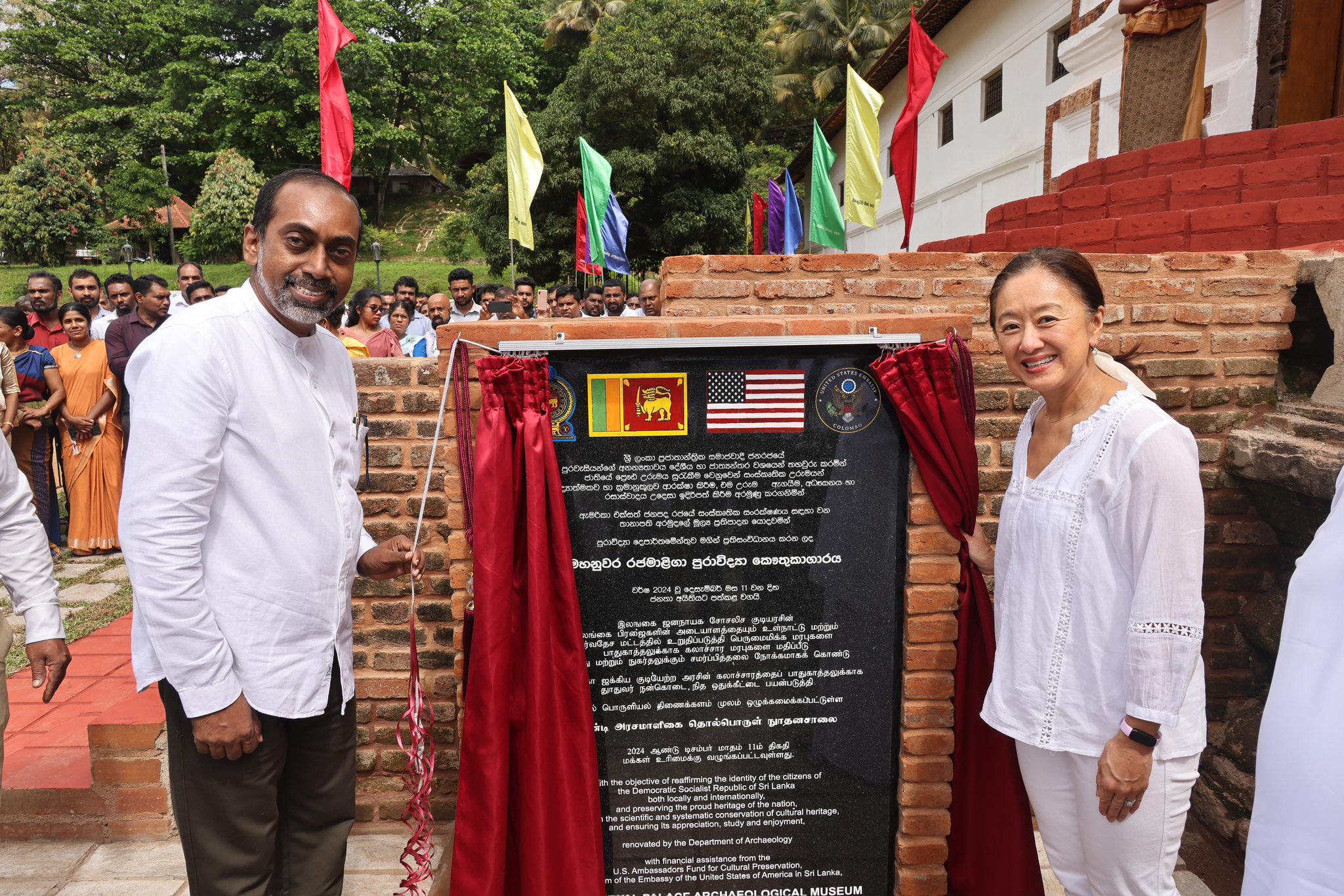
The Old Royal Palace and Archaeology Museum of the Temple of the Tooth Relic complex in Kandy was reopened today, after a lengthy restoration process.
The restoration project was funded by a grant of over $265,000 (approximately Rs. 77 million) from the US Ambassadors Fund for Cultural Preservation (AFCP), facilitated by the US Embassy in Sri Lanka in collaboration with the Ministry of Culture and the Department of Archaeology.
The reopening ceremony was attended by US Ambassador Julie Chung and Minister of Buddhasasana, Religious and Cultural Affairs, Prof. Hiniduma Sunil Senevi.
Initiated in 2021, the project was carried out in two phases. During the first phase, efforts were focused on conserving the historic infrastructure of the old Palace complex and improving accessibility for visitors with disabilities.
The second phase upgraded the Archeology Museum’s displays and facilities, creating a more engaging and educational experience for visitors while preserving Sri Lanka’s rich cultural heritage.
“The restoration of the Old Kandyan Kings’ Palace and Archaeology Museum is a testament to the power of partnership between the United States and Sri Lanka. Through initiatives like this, we not only preserve Sri Lanka’s cultural heritage for future generations but also showcase its history and traditions to the world. This museum stands as a gateway for both Sri Lankans and global visitors to explore the depth of the country’s history, fostering understanding and appreciation while supporting cultural tourism. We remain committed to working together on projects that celebrate Sri Lanka’s heritage and contribute to its economic and cultural vibrancy,” Ambassador Chung said.
“This project, supported by the United States through the Ambassadors Fund for Cultural Preservation, has made the Kandyan King’s Palace and Archaeology Museum more accessible and enriching for the public,” Minister Prof. Sunil Senevi said.
“By conserving the historic infrastructure and upgrading the museum’s displays, we have ensured that visitors—including those with disabilities—can connect with Sri Lanka’s rich cultural heritage in a meaningful way. This collaboration not only preserves our history but also creates a space for education and appreciation, showcasing our cultural identity to both Sri Lankans and the world,” he added.
Counsellor for Public Affairs at the US Embassy to Sri Lanka, Heidi Hattenbach noted that the Ambassadors Fund for Cultural Preservation (AFCP) is a vital tool in the United States’ global commitment to safeguarding cultural heritage.
“The restoration of the Kandyan King’s Palace through the Ambassadors Fund for Cultural Preservation is a testament to our commitment to safeguarding Sri Lanka’s cultural heritage while promoting sustainable tourism and economic growth. The preservation work enhances the site, providing both local and global visitors alike with a more immersive and meaningful experience of the rich history and legacy of the Kandy kingdom,” she said.
Over the past 23 years, the United States Ambassador’s Fund for Cultural Preservation (AFCP) has supported cultural preservation efforts in more than 140 countries worldwide.
In Sri Lanka, since 2001, the United States has collaborated with Sri Lankan archaeologists, historians, and diverse faith communities on 17 significant cultural and historical preservation projects.
These initiatives, supported by $1.3 million in funding from the American people, include the conservation of the Rajagala Buddhist forest monastery, the preservation of collections at the Anuradhapura Archaeological Museum, and the restoration of the Batticaloa Dutch Fort.
The preservation efforts also extend beyond land. Through the AFCP, the United States is helping to protect the Godawaya shipwreck—the oldest known shipwreck in the Asia-Pacific region—located off the coast of Hambantota. (Newswire)
